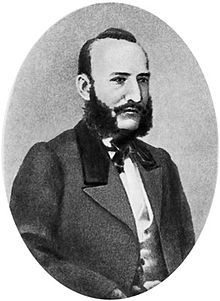Alexander Afanasyev
| Alexander Afanasyev | |
|---|---|
 |
|
| Born |
11 July 1826 Boguchar, Russian Empire |
| Died | 23 October 1871 (aged 45) Moscow, Russian Empire |
| Occupation | librarian, slavist |
Alexander Nikolayevich Afanasyev (Afanasief, Afanasiev or Afanas'ev,Russian: Алекса́ндр Никола́евич Афана́сьев) (11 July 1826 – 23 October 1871) was a Russian Empire Slavist who published nearly 600 Russian folktales and fairytales—one of the largest folktale collections in the world. The first edition of his collection was published in eight fascicules from 1855–67, earning him the reputation of the Russian counterpart to the Brothers Grimm.
He was educated at a high school in Voronezh and studied law at the University of Moscow, in which he attended the lectures of Konstantin Kavelin and Timofey Granovsky. He brought out a series of articles about leading personalities of the 18th century. Being a progressive, he failed his final exams (because of the inspector (ревизор) Sergey Uvarov) and could not have a chair in the university of Moscow.
Luckily, he was appointed librarian in the Archives of Moscow in 1849 and stayed there for 13 years until 1862. In that year, he was dismissed because of the scandal provoked by his publishing of the Russian Popular Religious Legends, which were a ferocious satire of the Orthodox clergy.
After his dismissal, he had a lot of trouble finding a new job and was penniless. This didn't stop him from writing his big theoretical work (three tomes of 700 pages each): The Poetic Outlook of Slavs about Nature, which came out between 1865 and 1869.
Censured by the Imperial authorities for his contacts with Socialist Alexander Herzen and suffering from tuberculosis, Afanasyev ended his life in penury, forced to sell his library to enable himself to eat. He died in Moscow aged 45.
Afanasyev became interested in old Russian and Slav traditions and stories in the 1850s ("folklore" as an area of study did not exist at the time). His first scholarly articles - The Wizards and Witches, Sorcery in the Ancient Rus, Pagan Legends about the Buyan Island - drew upon the so-called Mythological school that treated legends and tales as a mine of information for the study of more ancient pagan mythology (see his definitive work on the subject The Poetic Outlook on Nature by the Slavs). In such an interpretation, he regarded the fairy tale Vasilisa the Beautiful as depicting the conflict between the sunlight (Vasilisa), the storm (her stepmother), and dark clouds (her stepsisters). A great archivist, his works provide copious information, evidence, documents, and passages of the old chronicles relating to Old Russian culture, history and tradition, as well as other Indo-European languages, folklore and legends, in particular German traditions (he knew to perfection German as well as all Slav languages and ancient ones).
...
Wikipedia
